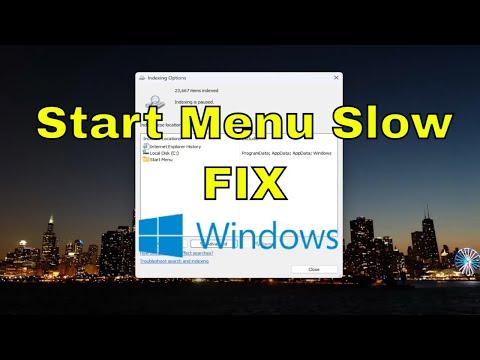I was having a particularly frustrating day. Everything seemed to be moving at a snail’s pace, and my patience was wearing thin. The root of my frustration stemmed from something seemingly trivial, but it was aggravating enough to make me question my sanity: the Windows Start Menu search function had suddenly become unbearably slow. I had always relied on this feature to quickly find files, applications, and settings, but now it felt like wading through molasses every time I tried to search for something.
It all started a few weeks ago when I noticed that searching through the Start Menu was taking longer than usual. At first, I thought it was just a minor glitch or temporary slowdown, but as days passed, the problem only got worse. What used to take a few seconds now stretched into minutes, and it was beginning to impact my productivity. Every time I clicked on the Start Menu and began typing, I was met with a spinning icon, and then, only after what felt like an eternity, the search results would finally appear. It was infuriating.
I decided that enough was enough and that I had to find a solution. I wasn’t a tech expert by any stretch of the imagination, but I knew my way around the basics of troubleshooting. I started by doing what I always do in situations like this: I turned to the internet. The first thing I discovered was that I wasn’t alone in facing this issue. Many other users had reported similar slowdowns with their Start Menu search, and it seemed to be a recurring problem.
The first suggestion I came across was to check for Windows updates. Sometimes, bugs and performance issues are fixed in the latest updates, and I hoped this might be the case here. I navigated to the Settings app, clicked on “Update & Security,” and checked for updates. As it turned out, there was an update pending, so I downloaded and installed it, hoping that this would resolve the issue. Unfortunately, after restarting my computer and trying out the search function again, I found that the problem persisted. It was clear that I needed to dig deeper.
Next, I read about a common culprit for slow search speeds: the Windows Search Indexer. This service helps to speed up searches by indexing files on my computer, but if it’s not working correctly, it can cause significant delays. I decided to troubleshoot this service. I opened the Control Panel, went to “Indexing Options,” and then clicked on “Advanced.” From there, I selected “Rebuild” to reindex my files. This process took some time, but I figured it was worth a shot. After it finished, I tried searching again, but the search was still sluggish. I began to think I was in over my head.
Determined not to give up, I decided to delve into more advanced troubleshooting methods. I found advice suggesting that there might be corrupted system files causing the problem. To address this, I ran the System File Checker tool. I opened the Command Prompt as an administrator and entered the command sfc /scannow. This tool scans for and repairs corrupted system files. It took a while for the scan to complete, but when it was finished, it reported that it had found and fixed some issues. Encouraged, I restarted my computer once more, but alas, the Start Menu search still lagged behind.
At this point, I felt like I was running out of options, but I was not ready to give up just yet. I decided to try a more drastic measure: resetting the Windows Search feature. I followed a guide that involved stopping the Windows Search service, deleting the search index folder, and then restarting the service. This was a bit technical, but I managed to follow the steps without too much trouble. After completing the process, I rebooted my computer and tested the search function. To my dismay, it was still not performing as it should.
Feeling a mix of frustration and determination, I decided to try one last approach. I had read about a potential conflict with third-party applications affecting the Start Menu search speed. I performed a clean boot of my system to rule out any interference from external programs. In this mode, only essential system services and drivers are loaded, which can help identify if other software is the cause of the problem. After booting into safe mode, I tested the search function again. To my relief, it was noticeably faster. This indicated that a third-party application or service was likely causing the slowdown.
I then started to identify and disable recent applications I had installed, testing the search speed after each one. Eventually, I pinpointed the culprit: a recently installed third-party tool that claimed to optimize system performance but was, in reality, hindering it. I uninstalled the problematic software, restarted my computer, and tested the search function once more. This time, the Start Menu search was back to its quick and responsive self.
Reflecting on the entire ordeal, I felt a profound sense of relief mixed with a touch of pride. I had navigated through a series of troubleshooting steps, each more complex than the last, and finally managed to resolve the issue. The problem with the slow Start Menu search was not just a minor inconvenience; it was a reminder of how interconnected and delicate our computer systems can be. Each step I took, from checking updates to rebuilding the index and troubleshooting potential conflicts, contributed to the solution. I learned that sometimes, perseverance and methodical problem-solving are all it takes to overcome technical challenges.
